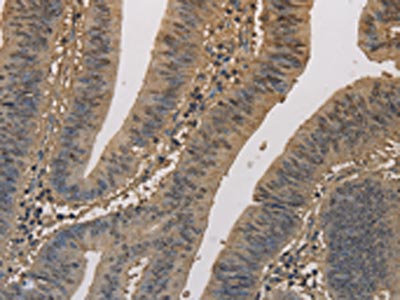
The image on the left is immunohistochemistry of paraffin-embedded Human colon cancer tissue using CSB-PA939360(ELOVL1 Antibody) at dilution 1/50, on the right is treated with fusion protein. (Original magnification: x200)
ELOVL1 Antibody

CSB-PA939360
ApplicationsWestern Blot, ELISA, ImmunoHistoChemistry
Product group Antibodies
ReactivityHuman
TargetELOVL1
Overview
- SupplierCusabio
- Product NameELOVL1 Antibody
- Delivery Days Customer20
- ApplicationsWestern Blot, ELISA, ImmunoHistoChemistry
- CertificationResearch Use Only
- ClonalityPolyclonal
- ConjugateUnconjugated
- FormulationLiquid
- Gene ID64834
- Target nameELOVL1
- Target descriptionELOVL fatty acid elongase 1
- Target synonyms3-keto acyl-CoA synthase ELOVL1; CGI-88; elongation of very long chain fatty acids (FEN1/Elo2, SUR4/Elo3, yeast)-like 1; elongation of very long chain fatty acids protein 1; ELOVL FA elongase 1; IKSHD; Ssc1; very long chain 3-ketoacyl-CoA synthase 1; very long chain 3-oxoacyl-CoA synthase 1
- HostRabbit
- IsotypeIgG
- Protein IDQ9BW60
- Protein NameElongation of very long chain fatty acids protein 1
- Scientific DescriptionElongation of very long chain fatty acid-like (ELOVL) proteins 1-6 are members of the ELO family of proteins, which play an important role in tissue-specific biosynthesis of very long chain fatty acids and sphingolipids. The ELOVL proteins act as catalysts in fatty acid elongation reduction and localize to the endoplasmic reticulum (ER). Elongation of very long chain fatty acids protein 1 (ELOVL1), also referred to as Ssc1, is the human homolog of the yeast ELO3 protein. It is expressed in a variety of tissues and at especially high levels in stomach, skin, intestine, kidney and lung. ELOVL1 participates in the elongation of very long chain saturated and monounsaturated fatty acids of up to 26 carbons and may be required for the development of a barrier in epithelial cells and skin. ELOVL1 is also important for the formation of Myelin in the central nervous system. Impaired ELOVL1 activity may be associated with disorders of sphingolipid metabolism.
- ReactivityHuman
- Storage Instruction-20°C or -80°C
- UNSPSC12352203

